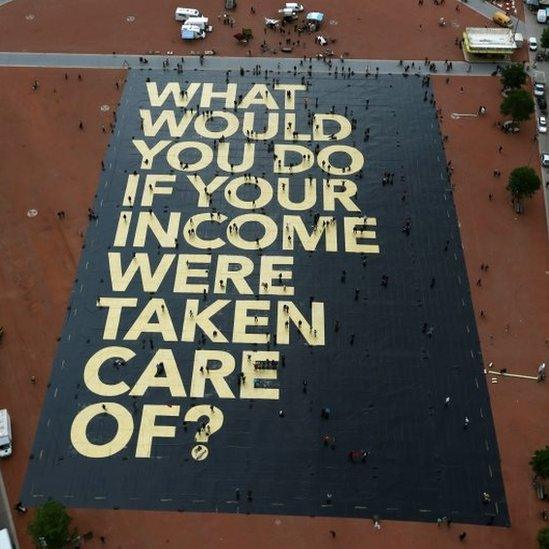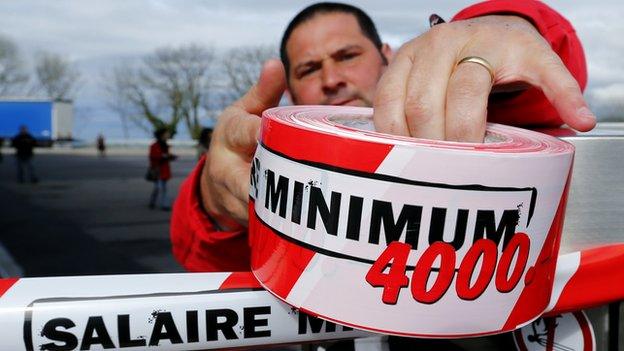Switzerland's voters reject basic income plan
- Published
Under the plan each citizen would receive an equal monthly payment, regardless of their circumstances
Swiss voters have overwhelmingly rejected a proposal to introduce a guaranteed basic income for all.
Final results from Sunday's referendum showed that nearly 77% opposed the plan, with only 23% backing it.
The proposal had called for adults to be paid an unconditional monthly income, whether they worked or not.
The supporters camp had suggested a monthly income of 2,500 Swiss francs (£1,755; $2,555) for adults and also SFr625 for each child.
The amounts reflected the high cost of living in Switzerland. It is not clear how the plan would have affected people on higher salaries.
The supporters had also argued that since work was increasingly automated, fewer jobs were available for workers.
Switzerland is the first country to hold such a vote.

Supporters of a basic income last month launched a giant poster campaign
There was little support among Swiss politicians for the idea and not a single parliamentary party came out in favour, but the proposal gathered more than 100,000 signatures and was therefore put to the vote under the Swiss popular initiative system.
Critics of the measure said that disconnecting the link between work done and money earned would have been bad for society.
But Che Wagner from the campaign group Basic Income Switzerland, argued before the vote that it would not be money for nothing.
"In Switzerland over 50% of total work that is done is unpaid. It's care work, it's at home, it's in different communities, so that work would be more valued with a basic income."

The popular initiative system
Allows citizens to suggest changes to the federal constitution
All initiatives that gather 100,000 signatures in 18 months go to a public vote
A constitutional amendment by initiative not only requires a majority public vote but a majority of cantons must also approve it
Differs from the mandatory referendum, which is called by parliament and does not need public signatures

Meanwhile, Luzi Stamm, a member of parliament for the right-wing Swiss People's Party, opposed the idea.
"Theoretically, if Switzerland were an island, the answer is yes. But with open borders, it's a total impossibility, especially for Switzerland, with a high living standard," he said.
"If you would offer every individual a Swiss amount of money, you would have billions of people who would try to move into Switzerland."
The wording on the initiative was vague, asking for a constitutional change to "guarantee the introduction of an unconditional basic income" but with no mention of amounts.
The idea is also under consideration elsewhere. In Finland, the government is considering a trial to give basic income to about 8,000 people from low-income groups.
And the Dutch city of Utrecht is also developing a pilot project that will begin in January 2017.
Another four issues were on the Swiss ballot on Sunday.
A proposal to speed up the country's asylum process was backed by nearly 67%
The Pro Service Public initiative proposing that bosses of big public sector companies should not earn more than government ministers - a reflection of dissatisfaction with railways and telecoms provider Swisscom. It was rejected by 68% of the voters
A proposal to allow genetic testing of embryos before they are inserted in the uterus in cases of in-vitro fertilisation, where either parent carries a serious hereditary disease. It was passed, with 62% backing it
Transport financing: An initiative from the car lobby which wants more investment in roads. The government had urged a "No" vote, and it was rejected by 71%.
- Published4 June 2016

- Published16 December 2015

- Published31 July 2015

- Published15 May 2014

- Published18 December 2013
